
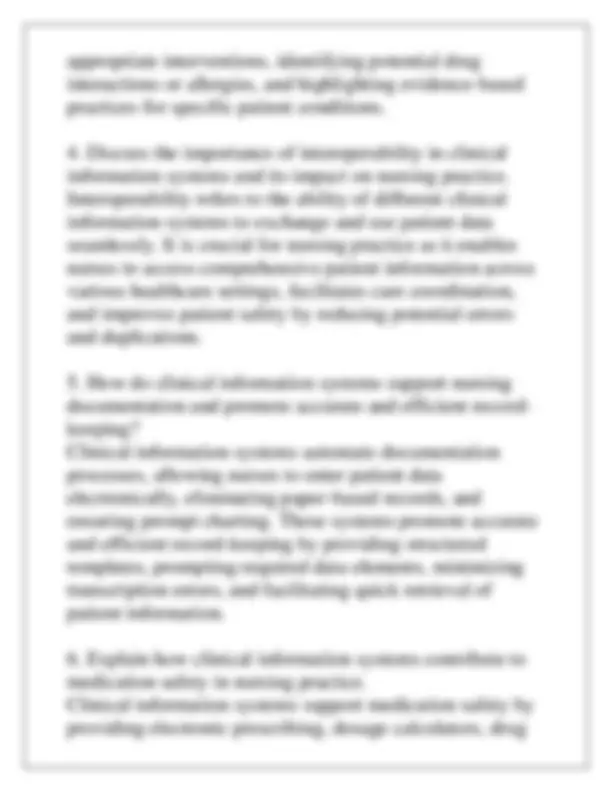
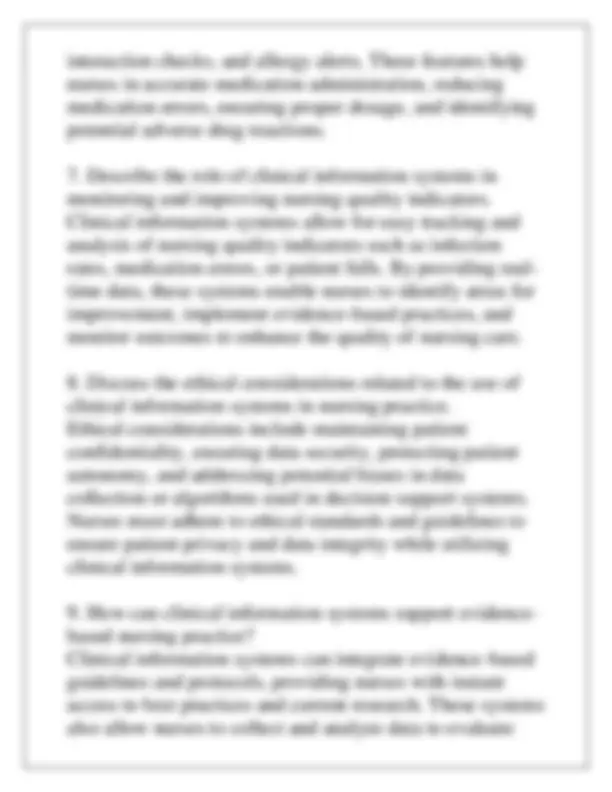
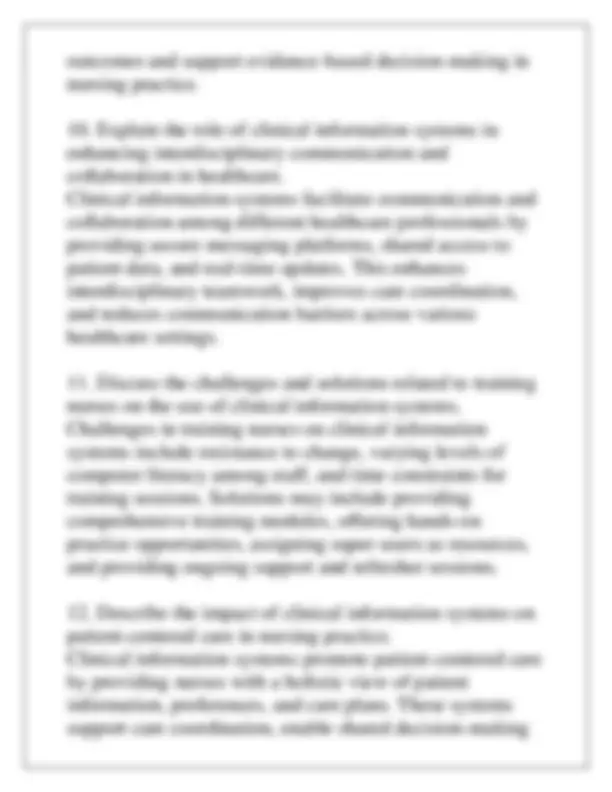
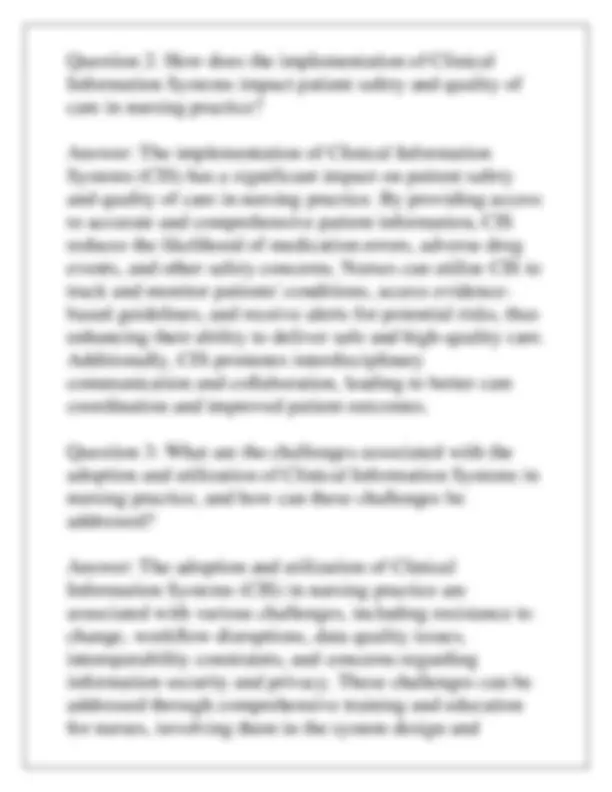
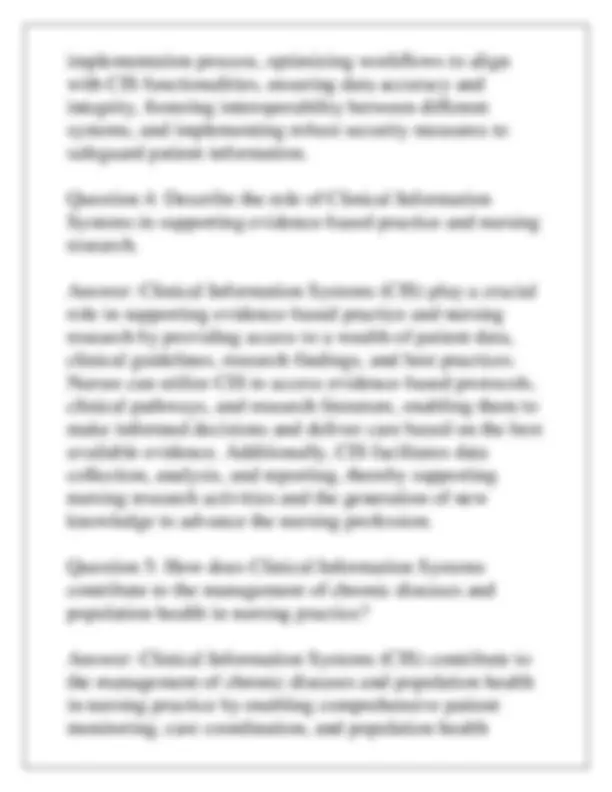
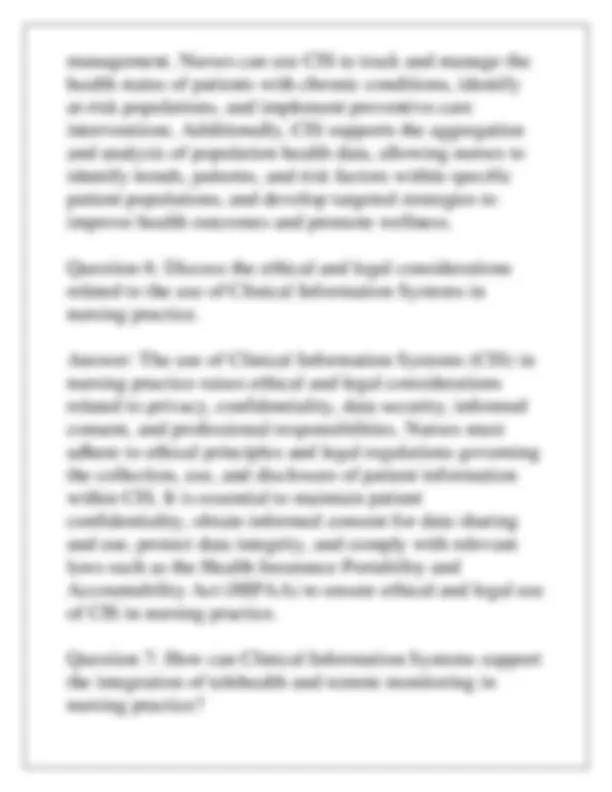
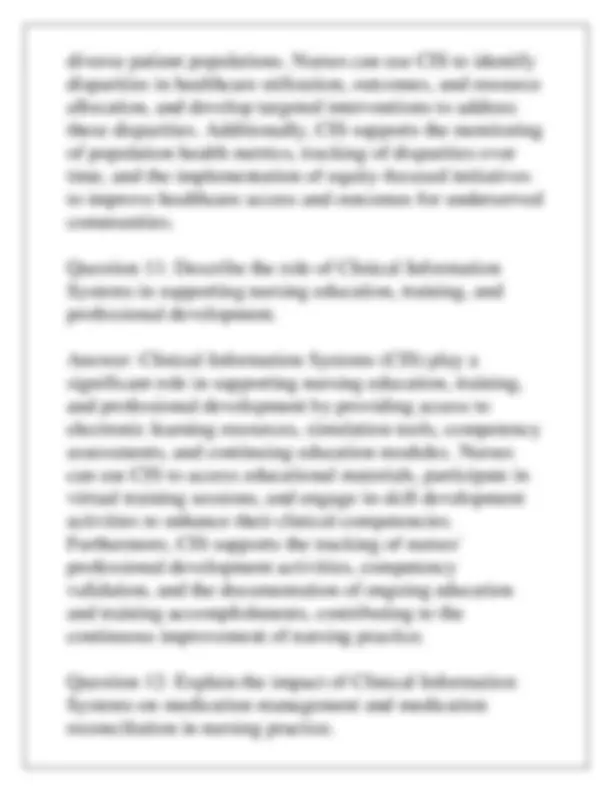
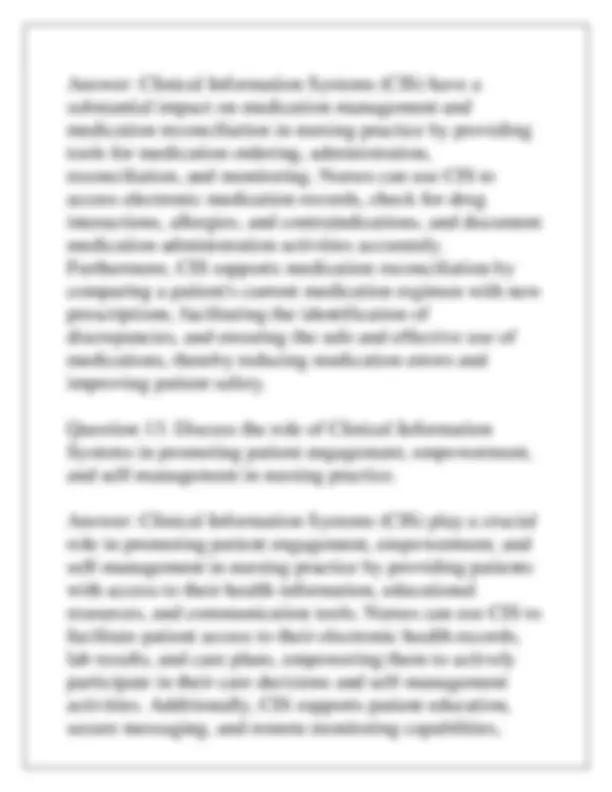
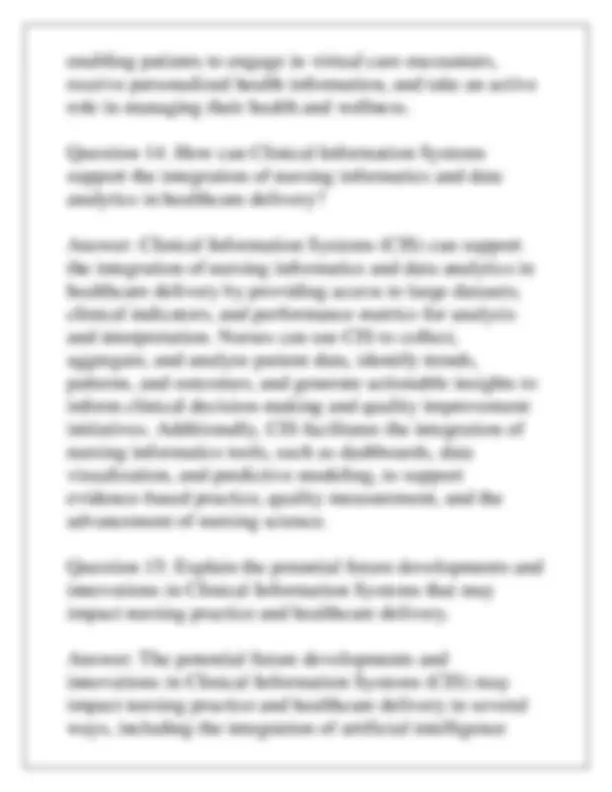


Study with the several resources on Docsity

Earn points by helping other students or get them with a premium plan


Prepare for your exams
Study with the several resources on Docsity

Earn points to download
Earn points by helping other students or get them with a premium plan
Community
Ask the community for help and clear up your study doubts
Discover the best universities in your country according to Docsity users
Free resources
Download our free guides on studying techniques, anxiety management strategies, and thesis advice from Docsity tutors
An overview of Clinical Information Systems (CIS) and their role in nursing practice. It discusses the key components of CIS, potential benefits and challenges of implementation, and the impact of CIS on patient-centered care, interdisciplinary communication, and nursing research. It also covers ethical and legal considerations related to the use of CIS, the integration of telehealth and remote monitoring, and the potential future developments and innovations in CIS that may impact nursing practice and healthcare delivery.
Typology: Exams
1 / 16

This page cannot be seen from the preview
Don't miss anything!










interaction checks, and allergy alerts. These features help nurses in accurate medication administration, reducing medication errors, ensuring proper dosage, and identifying potential adverse drug reactions.
outcomes and support evidence-based decision-making in nursing practice.
accuracy, standardization, and interoperability. Health informatics professionals work to optimize system functionality and usability, support decision-making processes, and enhance nursing practice through technology-driven solutions. B: Question 1: What are the key components of a Clinical Information System (CIS) and how do they contribute to the overall healthcare delivery process? Answer: The key components of a Clinical Information System (CIS) include Electronic Health Records (EHR), Computerized Physician Order Entry (CPOE), Clinical Decision Support Systems (CDSS), and Health Information Exchange (HIE). EHRs store patients' medical history, diagnoses, medications, treatment plans, immunization dates, allergies, radiology images, and laboratory test results, while CPOE allows healthcare professionals to enter medical orders directly into the computer system. CDSS provides clinicians with clinical knowledge and patient-specific information to enhance decision-making, and HIE enables the electronic sharing of patient information between different healthcare organizations. These components collectively contribute to improved patient care, enhanced efficiency, and better decision- making in healthcare delivery.
Question 2: How does the implementation of Clinical Information Systems impact patient safety and quality of care in nursing practice? Answer: The implementation of Clinical Information Systems (CIS) has a significant impact on patient safety and quality of care in nursing practice. By providing access to accurate and comprehensive patient information, CIS reduces the likelihood of medication errors, adverse drug events, and other safety concerns. Nurses can utilize CIS to track and monitor patients' conditions, access evidence- based guidelines, and receive alerts for potential risks, thus enhancing their ability to deliver safe and high-quality care. Additionally, CIS promotes interdisciplinary communication and collaboration, leading to better care coordination and improved patient outcomes. Question 3: What are the challenges associated with the adoption and utilization of Clinical Information Systems in nursing practice, and how can these challenges be addressed? Answer: The adoption and utilization of Clinical Information Systems (CIS) in nursing practice are associated with various challenges, including resistance to change, workflow disruptions, data quality issues, interoperability constraints, and concerns regarding information security and privacy. These challenges can be addressed through comprehensive training and education for nurses, involving them in the system design and
management. Nurses can use CIS to track and manage the health status of patients with chronic conditions, identify at-risk populations, and implement preventive care interventions. Additionally, CIS supports the aggregation and analysis of population health data, allowing nurses to identify trends, patterns, and risk factors within specific patient populations, and develop targeted strategies to improve health outcomes and promote wellness. Question 6: Discuss the ethical and legal considerations related to the use of Clinical Information Systems in nursing practice. Answer: The use of Clinical Information Systems (CIS) in nursing practice raises ethical and legal considerations related to privacy, confidentiality, data security, informed consent, and professional responsibilities. Nurses must adhere to ethical principles and legal regulations governing the collection, use, and disclosure of patient information within CIS. It is essential to maintain patient confidentiality, obtain informed consent for data sharing and use, protect data integrity, and comply with relevant laws such as the Health Insurance Portability and Accountability Act (HIPAA) to ensure ethical and legal use of CIS in nursing practice. Question 7: How can Clinical Information Systems support the integration of telehealth and remote monitoring in nursing practice?
Answer: Clinical Information Systems (CIS) can support the integration of telehealth and remote monitoring in nursing practice by facilitating the exchange of patient data, communication between healthcare providers and patients, and the management of virtual care encounters. Nurses can use CIS to access telehealth platforms, conduct remote patient assessments, monitor vital signs, and communicate with patients through secure messaging and video conferencing. Additionally, CIS enables the documentation of telehealth encounters, integration of remote monitoring data into patients' electronic health records, and coordination of follow-up care, thereby supporting the delivery of effective telehealth services. Question 8: Explain the role of Clinical Information Systems in promoting interdisciplinary communication and collaboration in healthcare delivery. Answer: Clinical Information Systems (CIS) play a vital role in promoting interdisciplinary communication and collaboration in healthcare delivery by providing a centralized platform for sharing patient information, care plans, and clinical documentation among multiple healthcare providers. Nurses can use CIS to communicate with physicians, pharmacists, laboratory staff, and other members of the healthcare team, share critical patient data, collaborate on care decisions, and ensure continuity of care across different settings. Additionally, CIS facilitates the exchange of secure messages, alerts, and notifications, enabling real-time communication and enhancing
diverse patient populations. Nurses can use CIS to identify disparities in healthcare utilization, outcomes, and resource allocation, and develop targeted interventions to address these disparities. Additionally, CIS supports the monitoring of population health metrics, tracking of disparities over time, and the implementation of equity-focused initiatives to improve healthcare access and outcomes for underserved communities. Question 11: Describe the role of Clinical Information Systems in supporting nursing education, training, and professional development. Answer: Clinical Information Systems (CIS) play a significant role in supporting nursing education, training, and professional development by providing access to electronic learning resources, simulation tools, competency assessments, and continuing education modules. Nurses can use CIS to access educational materials, participate in virtual training sessions, and engage in skill development activities to enhance their clinical competencies. Furthermore, CIS supports the tracking of nurses' professional development activities, competency validation, and the documentation of ongoing education and training accomplishments, contributing to the continuous improvement of nursing practice. Question 12: Explain the impact of Clinical Information Systems on medication management and medication reconciliation in nursing practice.
Answer: Clinical Information Systems (CIS) have a substantial impact on medication management and medication reconciliation in nursing practice by providing tools for medication ordering, administration, reconciliation, and monitoring. Nurses can use CIS to access electronic medication records, check for drug interactions, allergies, and contraindications, and document medication administration activities accurately. Furthermore, CIS supports medication reconciliation by comparing a patient's current medication regimen with new prescriptions, facilitating the identification of discrepancies, and ensuring the safe and effective use of medications, thereby reducing medication errors and improving patient safety. Question 13: Discuss the role of Clinical Information Systems in promoting patient engagement, empowerment, and self-management in nursing practice. Answer: Clinical Information Systems (CIS) play a crucial role in promoting patient engagement, empowerment, and self-management in nursing practice by providing patients with access to their health information, educational resources, and communication tools. Nurses can use CIS to facilitate patient access to their electronic health records, lab results, and care plans, empowering them to actively participate in their care decisions and self-management activities. Additionally, CIS supports patient education, secure messaging, and remote monitoring capabilities,
(AI) and machine learning algorithms for clinical decision support, the expansion of telehealth capabilities, the advancement of interoperability standards for seamless data exchange, the use of wearable devices and remote monitoring technologies for real-time patient data capture, and the enhancement of patient engagement tools and virtual care platforms. These developments have the potential to transform nursing practice by improving clinical workflows, enhancing patient outcomes, and advancing the delivery of patient-centered care in the evolving healthcare landscape.